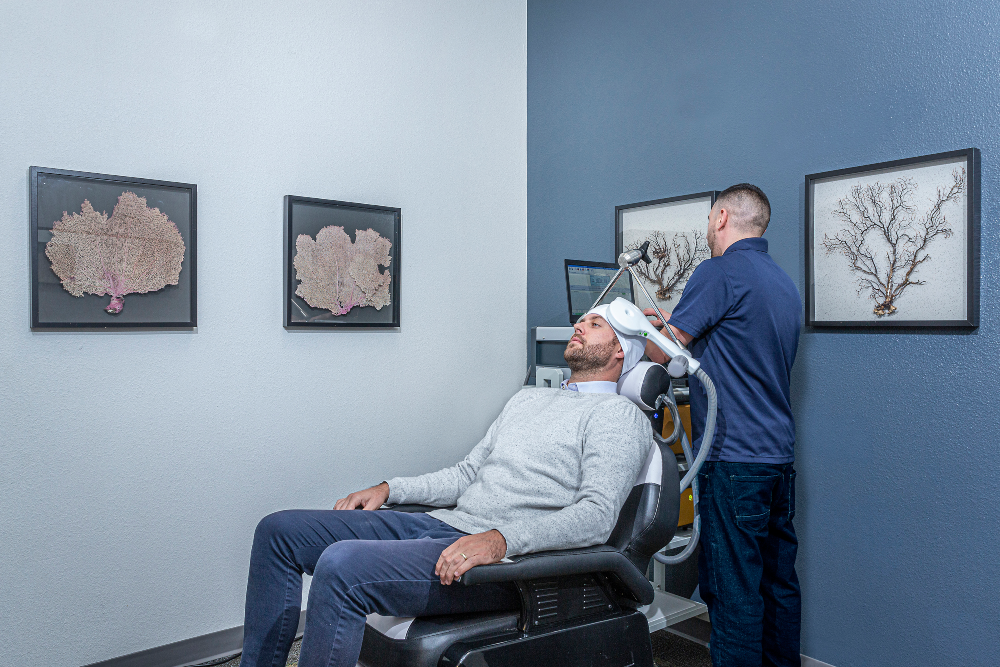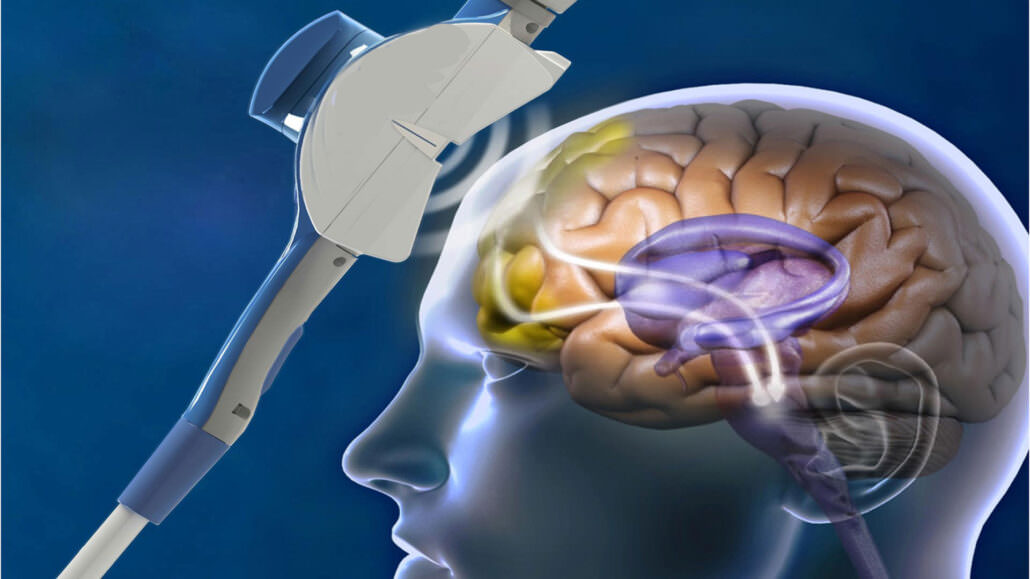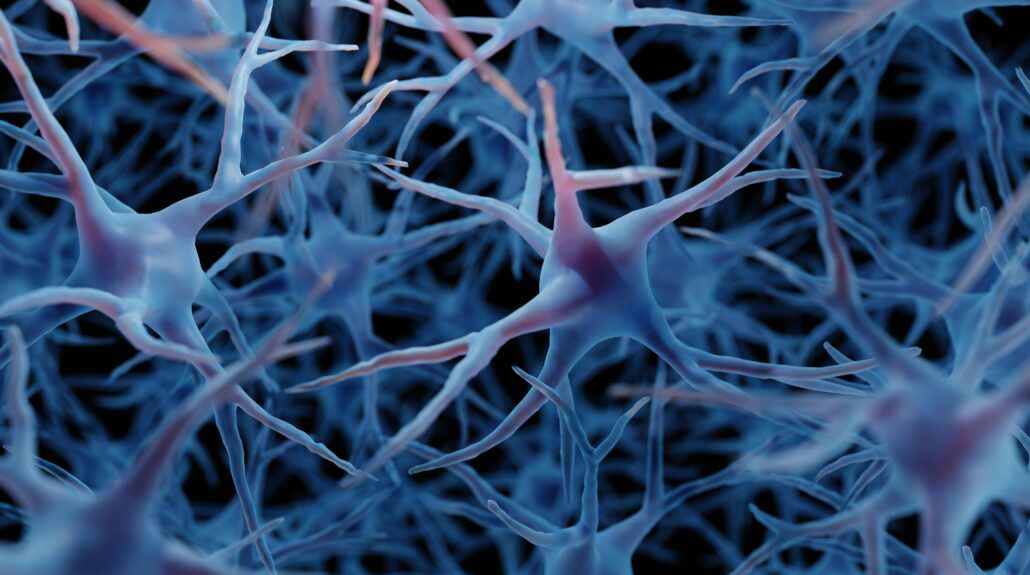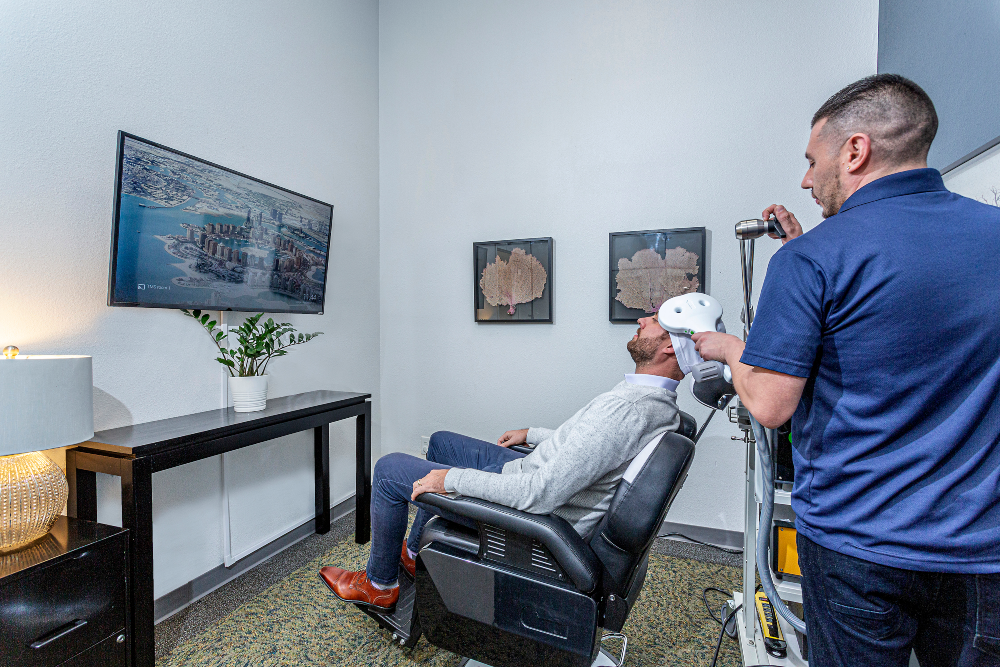If medications haven’t helped—or their side effects are holding you back—transcranial magnetic stimulation (TMS) may offer a safer, science-backed alternative. TMS is a non-invasive brain stimulation therapy that uses magnetic pulses to reawaken key areas of the brain linked to mood regulation and trauma recovery.
At Solara Mental Health, we provide TMS on-site as part of a veteran-exclusive environment. It’s especially effective for treating major depressive disorder (MDD), treatment-resistant PTSD, and obsessive-compulsive disorder (OCD)—and is fully FDA-cleared and covered by many insurance plans, including VA, for qualified diagnoses.


Transcranial magnetic stimulation is an FDA-approved, evidence-based treatment for major depressive disorder, anxiety, PTSD, and obsessive-compulsive disorder. It has been rigorously studied by leading institutions including the National Institute of Mental Health (NIMH), Harvard Medical School, Mayo Clinic, and Johns Hopkins University, among hundreds of others.
Unlike medications or invasive procedures, TMS is a non-surgical, non-pharmacological therapy that delivers focused magnetic pulses to stimulate under-active regions of the brain involved in mood regulation and emotional processing.
TMS uses a specialized device—similar to an MRI coil—that rests gently on the patient’s scalp and sends magnetic pulses into targeted areas of the brain. These pulses activate the brain’s nerve cells, promoting:
Most patients describe the sensation as light tapping on the head. There is no need for anesthesia, and no downtime; you can resume normal activities immediately after each session.
The magnetic pulses activate the brain’s nerve cells, promoting:
Mood disorders like depression are often rooted in disruptions to the brain’s chemical and electrical activity. Extensive research shows that TMS can help repair, reconnect, and regulate key neurological pathways—restoring balance where traditional treatments fall short. By improving communication between brain regions, TMS offers meaningful relief from depression and related mental health conditions.

Your first TMS session includes a private consultation with a Solara-affiliated psychiatrist in our dedicated TMS suite. After a brief setup and mapping session, the psychiatrist initiates the first treatment.

After your initial session, trained TMS technicians will administer treatments under the direct supervision of your prescribing psychiatrist.
Transcranial magnetic stimulation (TMS) is a noninvasive, medication-free treatment that uses magnetic pulses to restore healthy brain function. It is FDA-approved for treatment-resistant depression and supported by research across multiple conditions common in the veteran community.
TMS therapy improves attention, impulse control, and executive functioning by stimulating the prefrontal cortex—the brain’s command center for focus and decision-making. For veterans with adult ADHD who experience frustration, forgetfulness, or mental “gear-lock,” TMS offers a drug-free alternative to stimulants like Adderall.
Clinical studies show that TMS can enhance cognitive performance and reduce ADHD symptoms in adults who haven’t responded well to medication. At Solara, TMS is paired with coaching and behavioral therapies to build lasting focus, motivation, and self-management skills.
Veterans with chronic anxiety often live in a heightened state of fight-or-flight. TMS works by calming overactive circuits in the brain’s fear centers—specifically the amygdala and medial prefrontal cortex—helping to reduce hypervigilance, racing thoughts, and sleep disruption.
Clinical trials have demonstrated that TMS can significantly reduce symptoms of Generalized Anxiety Disorder (GAD), Panic Disorder, and stress-related insomnia. At Solara, we combine TMS with mindfulness, DBT-based emotional regulation groups, and trauma-informed care to create a calm, stable recovery process.
TMS does not treat autism directly but may help manage co-occurring issues like anxiety, emotional dysregulation, and cognitive overload. By targeting brain regions associated with sensory processing and social cognition, TMS helps reduce distress and support executive functioning.
Emerging research suggests that TMS can improve irritability, mood, and adaptability in adults with ASD. Solara customizes session environments to reduce sensory stress and supports each veteran with structure, consent-based pacing, and peer validation.
In bipolar disorder, depressive episodes can feel impossible to move through—and often don’t respond to traditional antidepressants. TMS may offer relief by activating under-functioning mood centers without triggering manic episodes, when used alongside stabilizing medications.
Clinical studies support TMS as a safe and effective intervention for bipolar-related depression. Solara’s psychiatrists oversee each protocol carefully, coordinating TMS with therapy and rhythm-focused lifestyle interventions to maintain emotional stability and prevent relapse.
When medication isn’t enough—or causes more harm than good—TMS may offer new hope. It’s FDA-approved for treatment-resistant depression, which affects many veterans with long-standing MDD. TMS reactivates dormant regions of the brain involved in motivation, mood, and emotional clarity.
Studies show that more than half of patients experience a significant reduction in depressive symptoms with TMS, even after multiple medication failures. At Solara, this therapy is embedded within a trauma-informed framework—alongside EMDR, individual therapy, and daily support in a veteran-centered environment.
TMS targets the specific brain circuit that drives obsessive thoughts and compulsive behaviors: the cortico-striatal-thalamic loop. By reducing overactivity in this pathway, TMS can ease intrusive thoughts and compulsions—especially when paired with Exposure and Response Prevention (ERP) therapy.
Veterans with treatment-resistant OCD often see marked symptom reduction after 6–8 weeks of consistent treatment. At Solara, we integrate TMS into a holistic program that includes ERP coaching, anxiety regulation tools, and peer accountability.
After a mild traumatic brain injury (TBI), many veterans experience lingering symptoms like cognitive fog, irritability, insomnia, or mood instability. TMS may support neuroplasticity—the brain’s ability to rebuild connections—by stimulating regions involved in focus, sleep regulation, and executive control. Research supports TMS as a promising treatment for post-concussive symptoms and blast-related injury. Solara customizes pacing to each veteran’s sensory tolerance and complements TMS with breathwork, neurofeedback, and restorative therapies for total brain support.
Tinnitus—persistent ringing or buzzing in the ears—is a common and disruptive condition for veterans with noise exposure from combat or machinery. TMS offers relief by reducing hyperactivity in the auditory cortex and related emotional processing regions, offering relief when other treatments have failed. Clinical trials show moderate success in decreasing both the perception and emotional burden of chronic tinnitus. At Solara, we combine TMS with sound desensitization, sleep hygiene, and stress reduction to treat both the neurological and psychological layers of tinnitus.
The advantages of Transcranial Magnetic Stimulation are both clinically proven and life-changing:
TMS is an optional add-on therapy offered on-site for targeted relief from depression, anxiety, and OCD. While not included in the program fee, reduced rates and flexible payment options are available for veterans in care.
If you wish to explore insurance coverage before beginning treatment, our billing team will:
No pre-approval or clinical documentation is required for private pay clients.